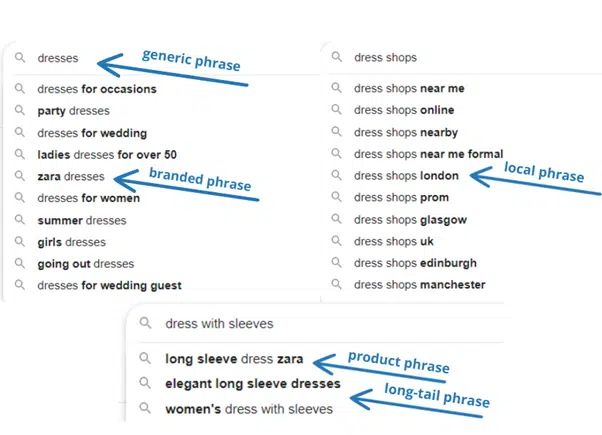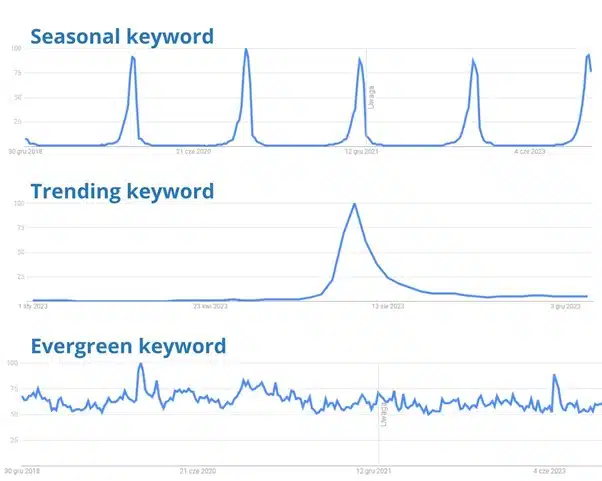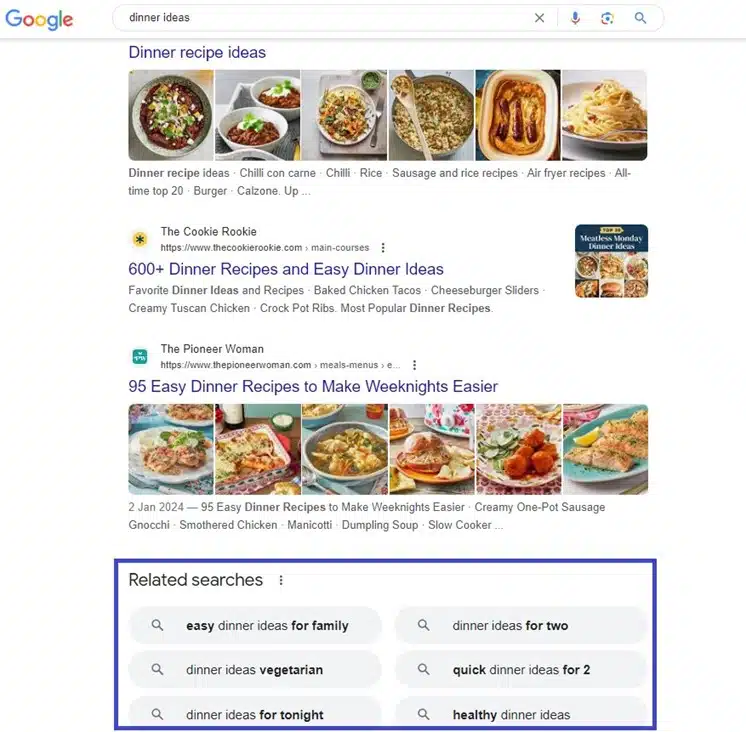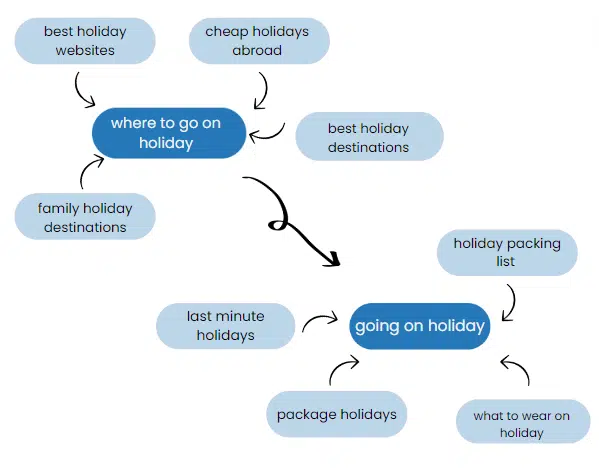The proper selection of keywords and placing them on the website should be the starting point of any SEO strategy. However, the visibility itself does not always translate into sales (at least not in all cases). So, how to build a well-thought out SEO strategy and select keywords for your business?
Keywords in SEO – what are they and how do they affect SEO effectiveness?
Keywords may consist of one or several words entered by users into the search engine. It is with their help that Internet users find information of interest on the Internet. All terms used in the search engine – whether a single word “pants” or a sequence of words “London weather” – are considered as key phrases. They allow users to reach a specific target group and achieve intended business goals.
It is worth remembering that each subpage should contain unique keywords so as not to cannibalize the most important phrases. The phenomenon of keyword cannibalization is a situation when search engine algorithms find at least two subpages that match a given user’s query. To avoid cannibalization, it is worth performing a professional content analysis that will enable the assessment of the content published on the website.
Imagine this situation. Your potential customer enters the query “trekking shoes” into the search engine, expecting, for example, a list of footwear useful on mountain trails. Google finds several addresses in your website structure that match this phrase. And this is where the confusion begins – which subpage better suits the user’s intentions? Google gets lost and takes too long to figure out what to display. In such a system, the competition benefits, and several of your subpages fall in the search results to far reaching places, where the customer’s eye usually does not reach.
After all, your website often has to compete in search results with many competitors. So why should we allow competition within our own site? Let’s remember to optimize individual URLs for unique keywords. This strategy will avoid a situation in which we direct search engine traffic to less important places on our website.
Types of keywords – do you know which ones are worth choosing in your SEO strategy?
There are several types of keywords in the industry, and each of them serves a different function. It is worth knowing all of them before we start using specialized keyword search engines. The process of selecting keywords itself is worth discussing during SEO consultations to best match your SEO strategy to your business goals.
The nature of keywords
Keywords in Google can be divided according to various criteria. One of them is the nature of the keyword phrase. We can distinguish key phrases here:
- generic
- long-tail
- branded
- product
- local
General or generic phrases (known as short-tail keywords) are usually universal and consist of 1-2 words. They have a high search volume and therefore, a lot of competition in SEO. Examples of generic phrases are “shoes”, “pants” and “furniture”. Such a query is entered most often by people who do not have concretized needs, but are only researching a topic.
On the other hand long-tail keywords have a low search volume but a valuable traffic that can bring to the website. They consist of 3 or more words and precisely define what the user is looking for on the Internet, “knee high heeled boots”, “living room furniture ideas”, “men’s electric mountain bike”.
Branded phrases are a special type of long-tail keywords. As the name itself indicates, they are based on the brand or brand + products/services offered by it. Users enter phrases: “IKEA furniture”, “Nike hoodie” or “Daniel Wellington watch” are familiar with specific brands and look for their offerings.
Additionally, users can search for a specific product model by entering specific queries, such as: “Apple Watch Ultra 2” or “MacBook Pro”. We call them product phrases. People searching for product terms are most often focused on purchasing a specific model.
A special type of keywords are local phrases tailored to businesses operating regionally. They contain the name of the region, city, district or area: “Beauty Salon London”, “Hairdressers Liverpool”. By optimizing for such phrases, we enable local customers to find our business and take advantage of its services.
Keywords and user intention
In recent years, Google has been increasingly understanding what the user wants to achieve after entering a phrase in the search engine. Can we also see the intentions of Internet users? Consider, when checking the results of the search engine on what results will appear in the SERP (Search Engine Results Page), for the phrase “trekking shoes” given earlier?
For this type of query, Google will most often display typical product subpages, matching them to the intent of the keyword (i.e., in this case, purchase). Therefore, it is difficult to try to optimize a typical guide post with such a phrase because there is a low probability of achieving high positions and gaining more traffic.
Keywords by search intent:
- Informational – they allow users to get the information they need to solve the given problem; e.g., “what is SEO?”, “sun”.
- Navigational – used to go to a specific page; e.g., “SEM House brief”, “Facebook login”.
- Commercial – suggest that the user has not yet made a final decision to purchase; e.g., “semrush review”, “electric scooter reviews”.
- Transactional – used to make a purchase of a specific product or service; e.g. ,”Nike winter men’s shoes”, “plumber edinburgh”.
Seasonal keywords
Seasonal popularity of keywords is related to changes in the frequency of searches for given terms. Key phrases “summer dresses” or “best place to go on holiday” are closely related to specific periods of the year. Therefore, we can say that they are seasonal phrases whose popularity increases cyclically, at a specific time.
It’s vital to remember that the increase in popularity of certain topics may also be associated with trends. Trends in user behavior are often short-lived and related to specific events, such as presidential elections or the release of a cinematic blockbuster. However, it is challenging to estimate the SEO impact on trending keywords. A free tool for analyzing search engine trends is Google Trends, which allows you to track the popularity of various keywords and topics.
In contrast to seasonal phrases and trends, there are evergreen phrases; i.e., always up-to-date content. “Evergreen keywords” enjoy consistent interest, and their popularity does not wane over time. Terms such as “house design”, “stomach exercises” or “how to make pancakes” are universal and do not age so quickly. They are able to systematically attract valuable traffic to the website.
How to choose the best keywords for SEO? 4 tips you can’t afford to ignore if you want to attract more customers
There are many methods for selecting keywords, and optimizing them can often be a source of concern for SEO copywriters. Remember that not every phrase is created equal, and some of them can even harm your business. Familiarize yourself with the best practices for choosing keywords that will help you reach your target audience.
Why is the keyword relevance so important?
There are several factors to consider when searching for the best SEO keywords. One of them is relevance. If your website aims to sell kitchen accessories, it is worth ensuring that the content refers to the understood topic of cooking. On this type of website there are no keywords like “how to repair a computer” or “trips abroad”. If keywords and content on the website comprehensively cover culinary topics, Google, guided by the topical authority rule, may consider your website as trustworthy on the given subject. Google will be more inclined to display your site at higher positions. To build authority in a specific niche, in addition to creating high-quality content, it’s essential to also focus on the technical optimization of your website. Technical errors can impede your progress in achieving higher search engine rankings.
A few words about competitiveness – is every keyword worth the attention?
When optimizing keywords it is worth remembering that business operates in an environment of competition – larger or smaller, depending on the industry. The more pages that are optimized for a specific keyword, the more its competitiveness increases. It can be mentioned that competitiveness is a certain degree of difficulty associated with the optimization of keywords in the search engine. It consists of several factors:
- the average number of searches
- the number of websites that rank for the query
- the number and the quality of results
- phrases related to the industry
That’s why not every keyword is worth pursuing. Investing in the optimization of a highly competitive keyword may prove to be not worthwhile. We could end up wasting resources and energy without being able to overtake the competition.
Watch out for seasonality! How to check the keyword frequency on Google?
The easiest way to check if users are searching for a particular keyword is to enter it into a search engine. Google allows us to leverage search suggestions or related searches lower on the SERP page. Of course, there are also special tools designed to evaluate the popularity of keywords, such as: Keyword Planner, Google Trends, Senuto, Semstorm or Ahrefs. Each of these tools can help search for and evaluate the keyword potential for our business.
There are many queries, whether seasonal or trend-related, that users search for during a particular period. The seasonality of keywords itself indicates that we will launch campaigns for phrases like “children’s skis” or “outdoor swimming pool” in different periods of the year. Remember that during the season, there is no shortage of people eager to optimize their websites on trending keywords, and it is essential to do so sufficiently.
Imagine yourself as a customer, i.e., there are reasons behind the phrases. What does the customer want to achieve?
Keywords do not appear on Google out of nowhere. Do you know who their authors are? Each of us who searches for information on the Internet. Whether you enter “gift idea” into the search engine, looking for inspiration for a birthday gift, or maybe “how to make banana bread” to surprise your family at dinner. By the way, you might even come across this article by entering the phrase “keywords in SEO”.
Therefore, how to determine what a user wants to achieve when searching for a particular phrase? Recall the section about types of keywords in relation to user intent. Make sure that your subpage is a good match for your customers’ intentions, and serve them only the content they want to see at that particular moment.
Is it worthwhile to examine the keywords used by competitors, and how can one “gain” keywords from market rivals?
Competitor analysis is a crucial step not to be overlooked in creating an SEO strategy. It can reveal trends in keyword optimization or reveal niches that we can leverage to our advantage. If our goals include reaching the top 10 search results, we must be aware of the actions of competitors currently holding high positions. It’s valuable to learn who our rivals are, what content they create, and which keywords they are targeting in Google.
Analyzing competitors’ keywords should be based on concrete data, so it’s best to conduct your research using tools, especially when competing with large websites. However, for those just starting their SEO journey and not ready to invest in advanced tools, it’s still possible to perform analysis without them. This method requires more effort and time but it is a viable option. For example, by utilizing free analytical tools or independently analyzing competitors’ websites, can be worthwhile. It’s essential to analyze:
- the homepage and its content
- titles, subheadings on individual subpages, and key phrases
- internal linking and anchor texts under which it is embedded
- topic clusters in which guides and blog posts are built
Keyword grouping – how to boost a website’s authority?
Depending on the services offered, a ready-made keyword list can contain from tens to hundreds of thousands of unique phrases. So, how do you not get lost among the vast SEO keywords? It will be useful to group phrases based on semantic relationships into topic clusters. They are the signal to Google’s robots that the website covers a lot of related content. The purpose of topic clusters is to focus on creating related content that revolves around a common topic. Clustering itself makes it easier for users to navigate the website, and conveys information to Google’s search engine about building an expert image and increasing domain authority.
Attract traffic to your website – how to optimize keywords for a single subpage?
It is assumed that each material should contain 3–4 types of phrases:
- The main phrase, which is the guiding theme around which we build specific content. Usually, it is a very general phrase with the highest search volume.
- Long-tail phrases, closely related to the main keyword. They will complement the text, often facilitating its optimization.
- Dependent keywords covering not only the main idea of the content but also various dependencies. These can be phrases or single words that aid algorithms in assessing the completeness of the material.
There is another type of keywords that can be planned when developing content. It’s essential to ensure that keywords for internal linking are direct to the same URL. A mistake that can create confusion in SEO efforts is linking the same keyword to different locations on the website, such as a blog post and a product subpage. If you’re wondering whether your website has a well-structured division of keywords, feel free to contact us by filling out the brief, and entrust the analysis to be done by top SEO and SEM consultants.
I already have key phrases – what’s next? How to do a keyword optimization?
When thinking about keywords in SEO, it’s essential to know how to properly place them on the website. After conducting a keyword analysis and selecting hundreds, or even thousands, of keywords.
Examples of keywords should be included in the title tag and meta description. These are two crucial elements that guide users and search engines about the content on a particular page. The content of the meta description itself is not considered as a factor that directly affects the website’s ranking. However, it can significantly increase the CTR (click-through rate) of our offer.
Indexing robots acknowledges the ALT attributes of images on our website. With alternative text, the robots can understand what is in a particular image and index it in search results. The ALT attribute is a good location to include keywords and they provide relevance to the content of the image.
Keywords should be placed in the H1 tag , and it is the most important heading on the page. The keywords help the search engines with the theme and structure of a specific subpage. This helps robots understand what the page is about. At the same time, it leads to increased visibility and better alignment with the user intent. The content on the subpage itself should also be enriched with various types of keywords. The goal is to create high-quality content that is optimized for search engines and to establish an everlasting online presence. All of these tools are vital elements for SEO optimization.









